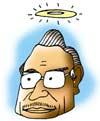|
|
| Help | |
| You are here: Rediff Home » India » News » Columnists » Capital Buzz |
|
| |||||||||||||||||||||||
|
| |||||||||||||||||||||||

Another case of privatisation gone wrong. Controversial Union Minister for Tourism Renuka Chowdhary is hard put to explain the long-term lease of a restaurant-cum-disco in ITDC's most prestigious property, The Ashoka Hotel, Chanakyapuri, New Delhi, to a private party.
Smelling something fishy, a section of hotel employees have taken their complaint to the Prime Minister through Abani Roy, the Rajya Sabha member belonging to the Revolutionary Socialist Party.
It may be recalled that Choudhary, a hardcore Telugu Desam Party supporter until she joined the Congress a few years ago, hit headlines for all the wrong reasons when, early in her career, she arbitrarily banned the sale of Black Label whisky at ITDC-run duty free shops. She wanted to cut a deal with the supplier before releasing his overdue arrears running into crores, but was obliged to backtrack once the issue made news.
Shivraj Patil plays solo
 Once again, the peculiar UPA arrangement -- based on a complete divorce between power and responsibility -- has caused the Congress a lot of avoidable embarrassment.
Once again, the peculiar UPA arrangement -- based on a complete divorce between power and responsibility -- has caused the Congress a lot of avoidable embarrassment.
Union Home Minister Shivraj Patil virtually played solo while handling the Nanavati Commission report on the 1984 anti-Sikh riots. Instead of consulting colleagues, Patil relied on his own political and intellectual resources. As everyone is now aware, he cut a very sorry figure indeed.
The report was submitted by Justice Nanavati to the home minister in February. For six months, Patil sat on it, without bothering to devise a workable strategy while the Opposition wanted it tabled in the House. When the Opposition mounted a shrill campaign for its release, the only person Patil consulted before drafting his Action Taken Report was Congress President Sonia Gandhi [Images] and her Man Friday Ahmed Patel. The two approved his decision not to take action on the 'vague' findings against Minister for Overseas Indians Jagdish Tytler based on a mere probability. Both Sonia and Patel had relied on Patil's version without actually reading the report themselves.
Having got the all-important nod, Patil presented Cabinet ministers with copies of the ATR, minus copies of the Nanavati Report. And since they knew he had clearance from the 'Power House' -- as a senior Congress minister describes Sonia Gandhi -- nobody said a word in disagreement. Not even Prime Minister Dr Manmohan Singh [Images]. The events that followed have been too well documented to require reiteration here.
The normal procedure in a case of such a politically sensitive report, which Patil fully ignored, required that he consult the Union law ministry to vet its findings. This, in turn, could have had the report examined by a battery of senior lawyers and other experts who would have offered a possible line of action. But Patil -- derisively dubbed Mr Raymond in Cabinet for his fondness for prim dressing -- didn't bother to consult anyone. He believed, not without reason, that since he drew his power direct from the Power House at 10 Janpath, he need not follow established procedures.
BJP not lukewarm on Nanavati
Much of Indian politics is media-driven. The other day, when a Delhi newspaper headlined a report 'BJP lukewarm on Nanavati report', the party leadership was quick to react. Senior BJP leaders were hurt by the implication that it wanted Jagdish Tytler sacked only to show solidarity with NDA ally the Akali Dal, though its heart was not in it.
Sure enough, a decision to act tough in Parliament was taken. When the Lok Sabha took up an adjournment motion on the report, the BJP contingent in the Rajya Sabha decided to do its bit. It forced the disruption of the House for the entire day, arguing that the PM, being a member, should be present to respond to queries. As required, however, the PM was in the Lok Sabha during a debate on the adjournment motion on the same report. He simply could not be present in the Upper House simultaneously.
Kalam's 'No' a mystery
 President A P J Abdul Kalam recently ignored a polite suggestion from the Prime Minister to attend Saudi King Fahd's funeral, causing much consternation. Given that Saudi Arabia is the world's biggest oil producer, given that it occupies a strategic position in India's ties with the Islamic world, given its close ties with the world's only superpower and, last but not least, given the presence of lakhs of Indian workers in that country, the government was keen for the President to fly down for the funeral.
President A P J Abdul Kalam recently ignored a polite suggestion from the Prime Minister to attend Saudi King Fahd's funeral, causing much consternation. Given that Saudi Arabia is the world's biggest oil producer, given that it occupies a strategic position in India's ties with the Islamic world, given its close ties with the world's only superpower and, last but not least, given the presence of lakhs of Indian workers in that country, the government was keen for the President to fly down for the funeral.
It found his refusal inexplicable, especially when he had attended, on much shorter notice, the funeral of a relatively minor UAE dignitary. Since protocol demanded that India send a high-level dignitary for the funeral, Union Power Minister P M Sayeed was wheeled in at the last moment.
How privatisation hurts...
 There are complaints galore against the BSES-run power distribution companies (Distcoms) in the capital. Most Delhiites, including scrupulously honest ones, have come to believe that the electronic meters installed run fast and that they are presented inflated bills. In sharp contrast, there are hardly any such complaints against the Tata-run Distcom allotted just one-third of the area given to the BSES-run companies. Also, the Tatas' task ordinarily ought to have been far more arduous, considering it covers the far-flung trans-Jamuna region.
There are complaints galore against the BSES-run power distribution companies (Distcoms) in the capital. Most Delhiites, including scrupulously honest ones, have come to believe that the electronic meters installed run fast and that they are presented inflated bills. In sharp contrast, there are hardly any such complaints against the Tata-run Distcom allotted just one-third of the area given to the BSES-run companies. Also, the Tatas' task ordinarily ought to have been far more arduous, considering it covers the far-flung trans-Jamuna region.
Concerned by rising complaints and the seeming failure of the BSES-owned Distcoms to address them, the Department of Consumer Affairs has specifically empowered the Bureau of Industrial Standards to ensure that the imported meters conform to its standards and are 100 per cent accurate.
However, in view of the practical difficulties in checking individual meters, the BIS proposes to authorise a number of laboratories to undertake the inspection at a nominal cost to aggrieved consumers.
Illustrations: Uttam Ghosh
Capital Buzz
|
|
| © 2007 Rediff.com India Limited. All Rights Reserved. Disclaimer | Feedback |